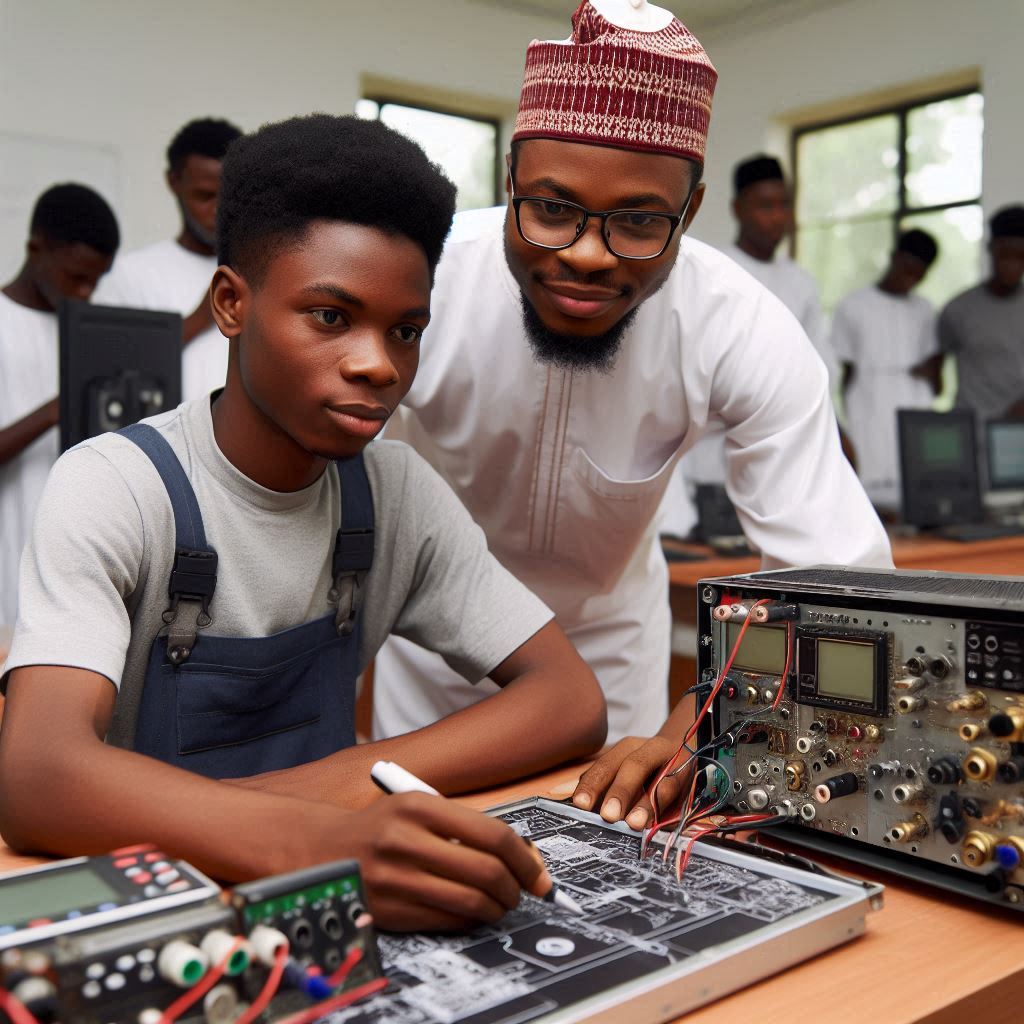Introduction
Technical education for women in Nigeria is a crucial issue that needs to be addressed.
Currently, women in Nigeria face challenges accessing quality technical education due to various factors including cultural norms and lack of resources.
Brief Background on the Current State of Technical Education for Women in Nigeria
In Nigeria, technical education is often seen as a male-dominated field, with limited opportunities for women to pursue careers in technical fields.
This lack of access to technical education hinders women from fully participating in the workforce and contributing to the country’s economic growth.
Empowering women through technical education is essential for gender equality and sustainable development in Nigeria.
By providing women with technical skills and knowledge, they can gain economic independence, break gender stereotypes, and contribute to the diversification of the economy.
In a nutshell, investing in technical education for women in Nigeria is not only a matter of gender equality but also a strategic move towards economic development and empowerment of women.
Challenges faced by women in accessing technical education in Nigeria
Women in Nigeria face numerous challenges when it comes to accessing technical education.
One major obstacle they encounter is the prevalence of societal stereotypes and gender norms that discourage them from pursuing fields traditionally seen as male-dominated.
These stereotypes can be deeply ingrained in Nigerian culture and society, making it difficult for women to break into technical fields.
Additionally, women in Nigeria often lack the resources and support needed to succeed in technical education programs.
This can include financial resources for tuition and materials, as well as access to mentorship and guidance from professionals in the field.
Without these essential resources, women may struggle to excel in their studies and pursue careers in technical fields.
Limited access to quality technical education institutions for women
Furthermore, limited access to quality technical education institutions poses a significant barrier for women in Nigeria.
Many women may not have access to institutions that offer the necessary programs and resources for technical education, forcing them to either pursue alternative paths or forgo their dreams of working in technical fields altogether.
Overall, the challenges faced by women in accessing technical education in Nigeria are numerous and complex.
Addressing these barriers will require concerted efforts from policymakers, educators, and society as a whole to create more inclusive and supportive environments for women seeking to enter technical fields.
Only by breaking down these barriers can women in Nigeria truly have equal opportunities to succeed in technical education and pursue fulfilling careers in technical fields.
Read: Scholarships for Counsellor Education Students
Empowering Women through Technical Education in Nigeria
In recent years, Nigeria has seen a surge in initiatives aimed at bolstering technical education opportunities for women.
These efforts are pivotal in fostering gender equality and empowering women to thrive in traditionally male-dominated fields.
Government Policies and Programs
The Nigerian government has implemented robust policies to promote gender equality in education, specifically targeting technical fields.
Initiatives such as scholarships and specialized training programs aim to bridge the gender gap in technical education. These efforts not only encourage women to pursue careers in STEM (Science,
Technology, Engineering, and Mathematics) but also provide essential support throughout their educational journey.
Non-Governmental Organizations (NGOs) Initiatives
NGOs play a crucial role in complementing government efforts by offering scholarships and training opportunities tailored for women interested in technical disciplines.
Organizations like Women in Technology in Nigeria (WITIN) and the Nigerian Women Techsters Initiative provide mentorship, networking opportunities, and financial aid to aspiring female technologists.
These programs not only facilitate access to education but also nurture leadership skills necessary for career advancement.
Private Sector Partnerships
Partnerships between private sector companies and educational institutions are pivotal in improving access to technical education for women.
Through collaborations with companies in sectors such as telecommunications, engineering, and information technology, educational institutions can enhance their curriculum, offer internships, and provide real-world experience to female students.
These partnerships bridge the gap between academia and industry, ensuring that graduates are equipped with relevant skills and knowledge.
Challenges and Opportunities
Despite progress, challenges remain in achieving gender parity in technical education. Socio-cultural barriers and inadequate infrastructure continue to hinder women’s access to quality education in technical fields.
Addressing these challenges requires sustained efforts from government, NGOs, and private sector stakeholders to create an inclusive and supportive environment for women pursuing technical careers.
Future Prospects
Looking ahead, the future of technical education for women in Nigeria appears promising with continued collaborative efforts.
Strengthening institutional support, expanding scholarship opportunities, and fostering mentorship programs are essential steps towards creating a vibrant ecosystem where women can thrive in technical professions.
By investing in women’s education and empowerment, Nigeria can harness its full potential and drive innovation and economic growth in the digital age.
In fact, the landscape of technical education for women in Nigeria is evolving, thanks to proactive measures by government entities, NGOs, and private sector partners.
By breaking down barriers and providing opportunities, these initiatives are paving the way for a more inclusive and prosperous future where women contribute significantly to Nigeria’s technological advancement.
Read: Future Prospects of Secretarial Education in Nigeria
Success Stories of Women in Technical Fields in Nigeria
In Nigeria, women are breaking barriers in technical fields, defying odds to achieve remarkable success. One such trailblazer is Adaobi Nwaneri, a software engineer who founded a tech startup at just 25.
Her journey from a small town in Anambra State to the forefront of Nigeria’s tech scene inspires many.
Another notable figure is Dr. Ifeoma Akabogu-Chinwuba, a renowned biomedical engineer.
She pioneered the development of affordable medical devices tailored for Nigerian healthcare challenges. Her innovations have saved countless lives and earned international recognition.
Profiles of Women Overcoming Barriers
Despite societal challenges, women like Amina Mohammed, a civil engineer, have risen to prominence. Starting as the only female in her engineering class, she persevered to become a respected infrastructure consultant.
Her story underscores resilience in a male-dominated field.
Zainab Mohammed’s journey from a rural village to becoming a top cybersecurity analyst is equally inspiring.
She battled stereotypes and lack of resources, leveraging online courses and mentorship programs to achieve expertise in cybersecurity. Her expertise now safeguards critical infrastructures in Nigeria.
Women-led Projects and Innovations
Women-led initiatives are reshaping Nigeria’s technical landscape. Oluwatobi Ayodeji founded a renewable energy startup focused on solar power solutions for rural communities.
Her company has electrified over 5,000 households, providing sustainable energy access where it’s needed most.
In the agricultural sector, Funmilayo Babatunde developed an automated irrigation system.
Her innovation increases crop yield in drought-prone regions, boosting food security and economic stability for local farmers.
Impact on the Nigerian Economy and Society
Empowered women in technical fields are catalysts for economic growth and societal progress. By closing the gender gap in STEM, Nigeria gains diverse perspectives and innovative solutions to complex challenges.
The economic impact is evident in sectors like technology, where startups founded by women contribute significantly to GDP growth.
Moreover, increased female participation in technical industries reduces unemployment and poverty rates, empowering communities across the country.
In society, these women serve as role models, encouraging younger generations to pursue careers in STEM. Their achievements challenge stereotypes and promote inclusivity, fostering a more equitable future for all Nigerians.
Women in Nigeria are redefining success in technical fields, demonstrating resilience, innovation, and leadership.
Their stories of overcoming barriers, leading groundbreaking projects, and driving economic and social change inspire a new generation of trailblazers.
As the nation continues to invest in technical education for women, these achievements will only amplify, propelling Nigeria towards a future where gender equality in STEM is the norm rather than the exception.
Read: Role of Secretarial Staff in Nigerian Organizations

Recommendations for improving technical education opportunities for women in Nigeria
When it comes to improving technical education opportunities for women in Nigeria, there are several key recommendations that can make a significant impact:
Increased Funding for Technical Education Programs Targeting Women
One of the most crucial steps in enhancing technical education for women in Nigeria is to allocate more resources and funding towards programs specifically designed to cater to the educational needs of women.
This can help in creating more opportunities for women to pursue technical fields and acquire valuable skills that can lead to better career prospects.
Gender-Sensitive Curriculum and Teaching Methods
It is essential to develop a curriculum that is gender-sensitive and caters to the specific needs and challenges faced by women in technical fields.
This involves incorporating teaching methods that support and empower women, as well as creating a learning environment that is inclusive and promotes gender equality.
Mentorship and Networking Opportunities
Providing mentorship and networking opportunities for women in technical professions is another vital aspect of enhancing technical education for women in Nigeria.
By connecting female students and professionals with mentors who can provide guidance, support, and advice, women can gain valuable insights and skills that can help them succeed in their careers.
Overall, by implementing these recommendations and prioritizing the advancement of technical education opportunities for women in Nigeria,
we can help bridge the gender gap in technical fields and empower more women to pursue fulfilling and successful careers in these areas.
Read: Career Paths for Graduates of Counsellor Education
Future Prospects for Women in Technical Fields in Nigeria
The future for women in technical fields in Nigeria is promising. With increasing awareness and efforts towards gender equality, more opportunities are opening up.
Companies and organizations are recognizing the value of diversity in technical sectors, leading to greater inclusion of women.
As the nation progresses technologically, there is a growing demand for skilled professionals in fields such as engineering, information technology, and renewable energy.
Women who pursue careers in these areas can expect to contribute significantly to the country’s development and innovation.
Potential Areas of Growth and Development
Several sectors show promising growth potential for women in technical industries in Nigeria. Renewable energy is one such area, with initiatives aimed at expanding access to clean energy solutions across the country.
Information technology continues to be a cornerstone of global progress, offering opportunities for women in software development, cybersecurity, and digital transformation.
Engineering, particularly in infrastructure development and telecommunications, presents avenues for women to apply their technical skills and drive impactful projects.
Role of Women in Driving Innovation and Sustainable Development
Women play a crucial role in driving innovation and sustainable development in Nigeria. Their perspectives and insights contribute to more holistic solutions in technical fields.
In sectors like agriculture technology (agritech) and healthcare innovation, women are pioneering advancements that address local challenges and improve quality of life.
By championing sustainability practices and leveraging technology, women professionals are catalysts for positive change in their communities and beyond.
Importance of Continuous Support and Investment in Technical Education for Women
Continuous support and investment in technical education are paramount for empowering women in Nigeria.
Access to quality education and training equips women with the skills needed to thrive in competitive technical environments.
Scholarships, mentorship programs, and initiatives promoting STEM (Science, Technology, Engineering, and Mathematics) education are essential in cultivating a diverse talent pool.
Additionally, creating inclusive workplaces and networks fosters environments where women can excel and innovate freely.
In review, the future of women in technical fields in Nigeria is bright and full of opportunities.
By focusing on areas of growth like renewable energy and information technology, women can contribute significantly to sustainable development and economic growth.
Their role in driving innovation underscores the importance of continuous support for technical education and career advancement initiatives.
As Nigeria progresses towards technological advancement, empowering women in technical industries will be crucial for achieving inclusive and sustainable development goals.
This blog section highlights the potential and importance of women’s participation in technical fields, emphasizing the transformative impact they can have on Nigeria’s future.
Transform Your Career with Expert Guidance
Get personalized mentorship consulting that’s tailored to your unique path. Our expert advice is actionable and exclusive.
Get StartedConclusion
In summary, the journey towards equitable technical education for women in Nigeria is multifaceted but crucial. Addressing barriers and fostering inclusivity are pivotal.
Throughout this blog section, we explored the challenges hindering women’s access to technical education in Nigeria. Limited resources and cultural biases are significant obstacles.
Stakeholders must prioritize and actively support initiatives that promote technical education among women. Financial aid, mentorship programs, and policy reforms are essential for progress.
It is imperative for government bodies, educational institutions, and NGOs to collaborate. They must allocate resources and create policies that promote gender equality in technical education.
By empowering women through education, Nigeria can unlock its full potential. Diverse perspectives and innovative solutions will emerge, benefiting society as a whole.
Looking forward, envision a future where women in Nigeria have equal opportunities and representation in technical fields. This vision requires sustained effort and commitment from all stakeholders.
Eliminating gender disparities in technical education will foster economic growth and social development. It is not just a matter of equality but of maximizing human potential.
Let us commit to fostering an environment where every woman in Nigeria can pursue and excel in technical careers. Together, we can build a more inclusive and prosperous nation.
Closing Thoughts
In closing, the path to achieving gender parity in technical education is challenging yet achievable. With determination and collective action, we can create a future where women thrive in all fields of expertise.
Join us in advocating for and supporting initiatives that empower women in technical education. Together, we can create lasting change and inspire generations to come.
It is time to unite efforts and resources towards a common goal: empowering women through technical education. Together, we can build a brighter and more equitable future for Nigeria.
In closing, let us not underestimate the transformative power of education. By investing in women’s technical education in Nigeria today, we sow the seeds for a prosperous and equitable tomorrow.




